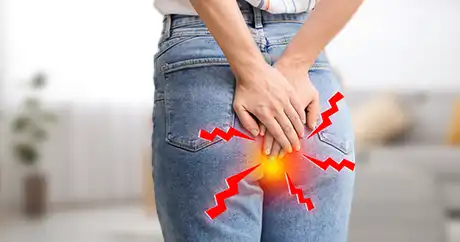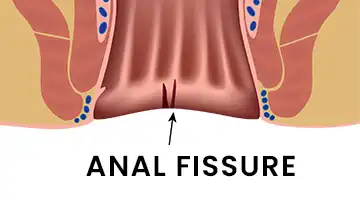LASER FISSURE TREATMENT IN Delhi NCR
Glamyo Health is a patient-centered, technology-driven healthcare provider dedicated to offer laser fissure surgery in Delhi NCR. Our expert doctors will take care of the minimally invasive fissure treatment with round-the-clock assistance from the medical coordinators in Delhi NCR.

1 Lakh+
Happy Patients
350+
Doctors
200+
Hospitals
40+
Cities
40,000+
Surgeries
WHY BOOK FISSURE SURGERY WITH GLAMYO HEALTH?
 Best Surgeons
Best Surgeons
 1 Day Discharge
1 Day Discharge
 Free Follow Ups
Free Follow Ups
 Free Pick Up & Drop Service
Free Pick Up & Drop Service
 All Insurances Covered
All Insurances Covered
 Advanced Procedure
Advanced Procedure
FISSURE SURGERY IN Delhi NCR
A minor incision or tear in the thin, moist tissue (mucosa) that lines the anus or the lining of the anal entrance, called the anal sphincter, causes an anal fissure. The skin damage can pull the margins of the fissure apart, causing the muscle to spasm and worsening the problem. When a spasm develops, the pain can be excruciating, and the wound may take a long time to heal.
Constipation and chronic diarrhea are gastrointestinal diseases that exacerbate anal fissures over time. Itching, discomfort, and bleeding may occur with bowel motions. When you pass hard stools, you may develop an anal fissure. Anal fissures are extremely painful and can occur in persons of all ages (from infants to the elderly). The best fissure treatment is surgery, which is a simple operation.
Fissure requires immediate treatment & surgeries, get in touch with Glamyo Health and get the best fissure surgery in Delhi NCR by the best fissure specialists in Delhi NCR in the best fissure clinic nearby.

FISSURE DOCTORS IN Delhi NCR
View AllFISSURE HOSPITALS IN Delhi NCR
View All
Ruby Hall Clinic
Pune
MON-SAT | 10:00 am - 11:00 pm
Top Treatments
General Specialist,Gallstone,F...
FISSURE SURGERY COST IN Delhi NCR
View All
Type Of Surgery : Fissure
Hospitalization time : 1 - 2 Days
Cost Range : 35,000 INR to 75,000 INR, Avg. 55,000 INR
For the Cost Estimate : +917829142333
FISSURE SURGERY REVIEWS IN Delhi NCR
View All
Sudha devi
Fissure
Hi, my name is Rohin Singh and my mother Sudha devi. We consulted a good doctor for treatment and he prescribed surgery for Anal read more

 Fissure | Surgeries
Fissure | Surgeries Dr. Shuddhatam jain4
Dr. Shuddhatam jain4  Apollo Noida4.3 (115)
Apollo Noida4.3 (115) New Delhi
New Delhi

Sonali Rao
Fissure
Hi, my name is Sonali, I was admitted here for my surgery through Glamyo Health. I received a pick up and drop off facility, rig read more

 Fissure | Surgeries
Fissure | Surgeries Dr. Sunny Agarwal5
Dr. Sunny Agarwal5  Apollo Spectra Hospi...
Apollo Spectra Hospi...  Mumbai
Mumbai

Ananda r
Fissure
Hi, my name is Anand, I got to know about Glamyo Health through Facebook and I immediately contacted the given number. I had my read more

 Fissure | Surgeries
Fissure | Surgeries Dr. Bala Krishna M Naik5
Dr. Bala Krishna M Naik5  Vasavi Hospital4.1 (21)
Vasavi Hospital4.1 (21) Bangalore
Bangalore

Suresh Mitt ...
Fissure
Very good doctor. He did painless surgery, which is good for me. I got treated for fissure-in-Ano, and Dr. Hariom Gupta from G read more

 Fissure | Surgeries
Fissure | Surgeries Dr. Hari Om Gupta4
Dr. Hari Om Gupta4  D P Bora Superspecia...5 (5)
D P Bora Superspecia...5 (5) Lucknow
Lucknow

Vipul Yadav
Fissure
Good support from Glamyo Health Care. They supported me at every step and arranged everything at the hospital. Really happy that read more

 Fissure | Surgeries
Fissure | Surgeries Dr. Sunny Agarwal5
Dr. Sunny Agarwal5  SRV Mamata Hospital4.2 (24)
SRV Mamata Hospital4.2 (24) Mumbai
Mumbai

Arvind Sing ...
Fissure
Hello, my name is Arvind Singh. Just a few days back I had Piles surgery in Felix Hospital, Greater Noida. The effort put in by read more

 Fissure | Surgeries
Fissure | Surgeries Dr. Shuddhatam jain4
Dr. Shuddhatam jain4  Felix Hospitalnull (null)
Felix Hospitalnull (null) New Delhi
New Delhi

Gunasekar
Fissure
My Piles problem was really making me afraid that what if it got worse. So, I somehow found about Glamyo Health and decided to c read more

 Fissure | Surgeries
Fissure | Surgeries Dr. Bala Krishna M Naik5
Dr. Bala Krishna M Naik5  Kanva Sri Sai Hospit...
Kanva Sri Sai Hospit...  Bangalore
Bangalore

Priyansh Mi ...
Fissure
Good service, recommended for fissure treatment,Good service, Smooth Cashless procedure. Glamyo Health Care executive Priya Sing read more

 Fissure | Surgeries
Fissure | Surgeries Dr. Raj Kumar Singh4
Dr. Raj Kumar Singh4  Delhi Surgical Cente...4.3 (150)
Delhi Surgical Cente...4.3 (150) New Delhi
New Delhi

Naveen Kuma ...
Fissure
I had a great experience with Glamyo. My coordinator Ashok has been very supportive till the surgery got done and very informati read more

 Fissure | Surgeries
Fissure | Surgeries Dr. Bala Krishna M Naik5
Dr. Bala Krishna M Naik5  Kanva Sri Sai Hospit...
Kanva Sri Sai Hospit...  Bangalore
Bangalore

Monindra Ma ...
Fissure
I was in contact with Mr. Vishal Mathur, he was really helpful, he used to respond very positively whenever I called from the pr read more
.jpg)
 Fissure | Surgeries
Fissure | Surgeries Dr. Shuddhatam jain4
Dr. Shuddhatam jain4  Apollo Noida4.3 (115)
Apollo Noida4.3 (115) New Delhi
New Delhi
BENEFITS OF LASER TREATMENT
- Pain
- Stitches
- Recovery
- Blood Loss
- Follow Ups
- Cuts & Wounds
LASER SURGERY
- Minimally Painful
- Nominal
- 2 - 3 Days
- No or Minimal Blood Loss
- Not Required
- No
OPEN SURGERY
- Extremely Painful
- Significant
- 2 - 3 Weeks
- Significant Blood Loss
- Required
- Yes
WORRIED ABOUT PRICE?
Glamyo has made advanced fissure surgery affordable and accessible to all.
- Interest-free EMI facility
- Free follow-up consultation
- Free pickup & drop for surgery

FISSURE SURGERY IN Delhi NCR
Anal Fissures/(विदर) are extremely painful & disturbing. Often misunderstood as piles, Its symptoms are a whole other health issue one may come across. People don't openly discuss the condition as it's considered despicable or awkward. Sometimes anal fissures don't heal in time and get chronic, leading to various complications and discomfort. Fissures affect walking, sitting, passing motions, wearing tight clothes, etc., causing severe pain and irritation.
Hence, anal fissures require urgent medical assistance. If not treated on time, as described above causes various discomforts & irritation. Glamyo Health presents a complete guide to help you find the best fissure treatment options and the best fissure surgery alongside the best fissure doctors in the best Hospital for fissures in Delhi NCR.
Surgery Options in Delhi NCR
Your doctor may consider surgery if you have a chronic anal fissure that is resistant to previous treatments or if your symptoms are severe. Doctors commonly perform a lateral internal sphincterotomy (LIS) operation, which includes cutting a small piece of the anal sphincter muscle to relieve spasms and improve recovery. According to studies, surgery is far more beneficial than any other medical treatment for chronic fissures. Following are the surgery options for fissure we offer in Delhi NCR:-
Laser Surgery: The patient is given local or general anesthetic by the fissure specialist before the procedure. At the surgery site [anal fissure location], the doctor employs a laser probe to emit infrared radiation or laser beams. The high-energy laser beams encourage speedy and proper healing of the fissure by increasing blood flow to the location of the crack.
Lateral sphincterotomy: Doctors advocate lateral sphincterotomy as the most common fissure surgery. It is the least intrusive fissure surgery treatment and is painless. The procedure entails using a highly precise laser beam to make an incision in the sphincter muscle (i.e. the anal muscle that aids in stool passage). This relieves the fissure's stress and allows the damaged area to heal. The technique is straightforward and aids in the prevention of recurrence.
If you are looking for the best, advanced, effective & affordable fissure treatment we would suggest you, go for a laser fissure treatment, as laser fissure surgery has a lot of advantages and a quicker recovery rate, and very low chances of recurrence. Moreover, if you are searching for fissure treatment in Delhi NCR, in Budget, Contact us through our website, or book an appointment for free counselling and a hassle-free treatment experience.
FREQUENTLY ASKED QUESTIONS
YOUR JOURNEY WITH US
Free Doctor Consultattion

Smooth Hospital Admission

Hassle Free Insurance Approval

Advanced Day Care Surgery

Free Pick Up & Drop Services












 New Delhi
New Delhi  Bangalore
Bangalore  Mumbai
Mumbai  Hyderabad
Hyderabad  Pune
Pune  Chennai
Chennai 
